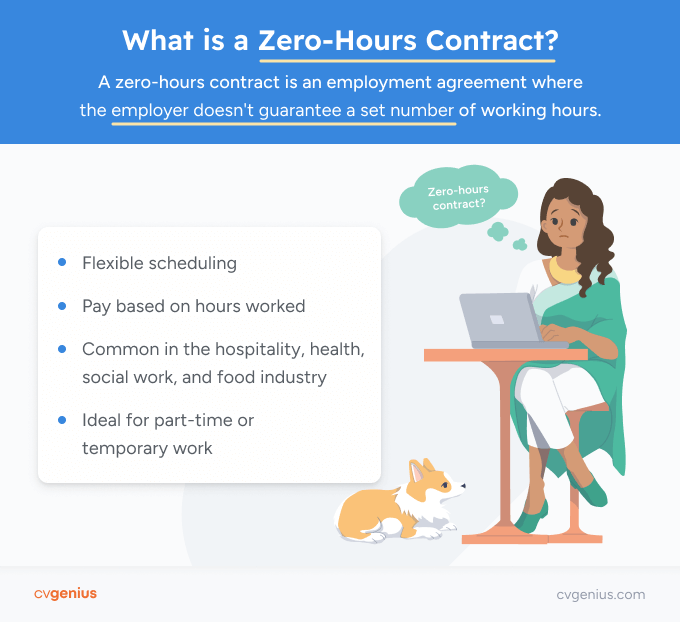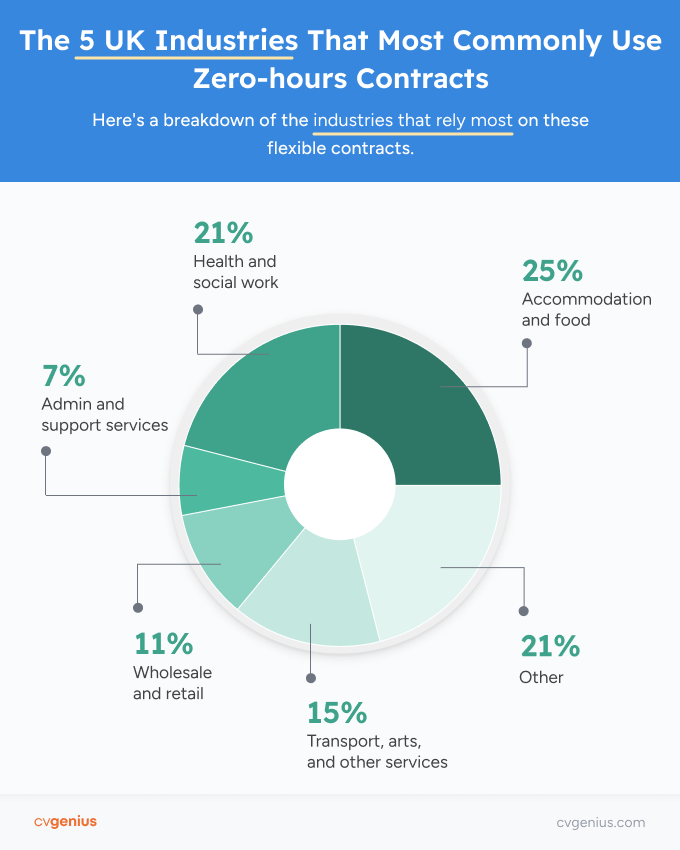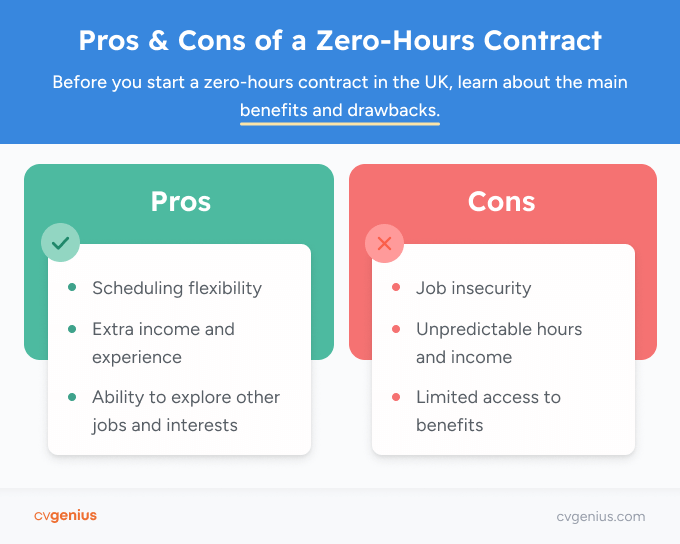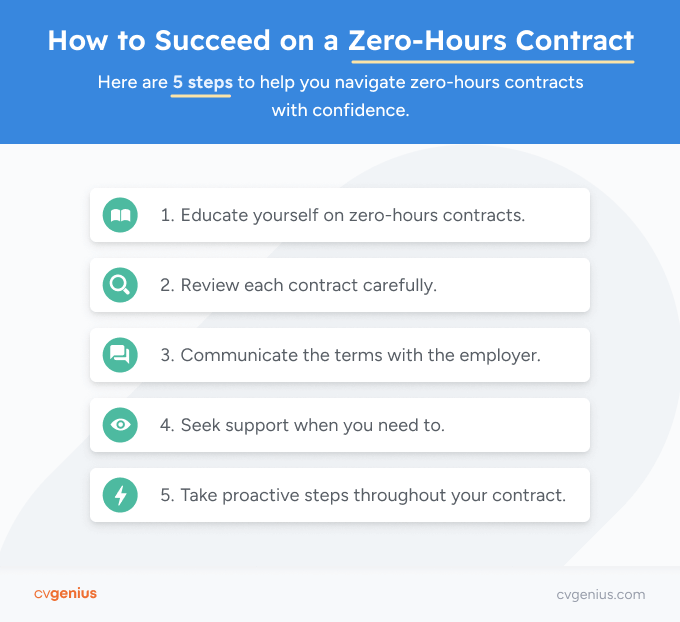Zero-hours contracts are widely used in the UK, and we’re here to help you understand how they work.
Whether you’ve come across zero-hours contracts in the news or are considering flexible work options, learn more about zero-hours contracts and whether they could be a good fit for you.
Get a complete run-down on zero-hour contracts, including:
- what a zero-hours contract is
- pros and cons of zero-hours contracts
- steps to assess the value of a zero-hours contract
- frequently asked questions about zero-hours contracts
- finding a zero-hours opportunity
What is a zero-hours contract?

A zero-hours contract, also known as a ZHC or a casual contract, is an employment agreement where:
- the employer doesn’t guarantee a specific number of working hours for the employee
- the employee isn’t obliged to accept any offered work
Under this arrangement, the employee’s hours can vary each week based on the employer’s needs, providing flexibility for both sides.
While zero-hours contracts offer more freedom, they also come with challenges for workers, including uncertain income and more limited access to benefits compared to full-time or part-time contracts with guaranteed hours.
Career Expert James Innes states:
‘While there are some benefits to the flexibility offered by these contracts, especially for those who need to balance work with other commitments, they also have significant downsides. One of the main issues is the uncertainty they create for workers, who are often unsure how many hours they will work from one week to the next, leading to unpredictable income. This can have significant effects on work-life balance and mental health, as well as contribute to socioeconomic inequality.’
These issues have even sparked debate about outlawing zero-hours contracts altogether.
In the next sections, we’ll look at the regulations surrounding zero-hours contracts and evaluate their pros and cons.
The rise of zero-hours contracts
Zero-hours contracts were first officially sanctioned in the UK with the Employment Rights Act 1996.
Zero-hours contracts grew in popularity after the financial crisis of 2007. This type of employment, along with agency work, temporary work, and low-paid self-employment, accounted for around two-thirds of UK employment growth post-2008. The Trade Union Congress (TUC) has expressed concern that a significant number of workers continue to be ‘trapped’ in these unstable jobs.
According to the International Labour Office in Geneva (ILO), the rise of the ‘gig economy’ (flexible, short-term work) in the early 2010s then led to an increase in zero-hours contracts, allowing companies like Uber and Deliveroo to use these contracts to manage changing demand and offer temporary work opportunities.
Since then, zero-hours contracts have become more common in industries that value flexibility.
Zero-hours contracts are becoming more common
According to data from the Office for National Statistics (ONS), the number of people on zero-hours contracts in the UK increased to approximately 1.18 million by mid 2023, from 1.03 million in the previous year.
According to Innes, the future is grim for workers on zero-hours contracts:
‘Recently, there has been a worrying trend with companies, particularly in the rapid grocery delivery sector, moving away from guaranteed hourly rates to gig-economy contracts, in an attempt to save costs. This shift is taking place despite the UK Supreme Court’s ruling that gig-economy workers, like Uber drivers, should be classified as workers.
Unfortunately, this ruling has not resulted in the introduction of new protections or stricter enforcement in the gig economy, which has given companies the green light to revert to these potentially exploitative contracts. In terms of future predictions and trends, if the current legislative environment remains unchanged, I anticipate that more companies will consider moving to zero-hours contracts. This is particularly true in industries that have rapidly expanded during the pandemic and are now facing a cost of living crisis.
For instance, Just Eat, a company that expanded into the on-demand grocery market, recently announced that it was laying off workers in the UK and returning to a gig-economy model. The industry is seeking clarity and updated laws to address the ambiguities surrounding these contracts and the gig economy in general. If the government does not take action soon, the repercussions could be severe for the workers involved.’
Notably, the use of these contracts in Scotland, described as ‘exploitative’, has doubled despite governmental promises to review their use.
The service industry loves zero-hours contracts
Zero-hours contracts are widely used in the UK across different industries, but some sectors rely on them more than others.
As reported by the ONS in 2023, here are the top industries in the UK that use zero-hours contracts by percentage:

- Accommodation and food: 25%
- Health and social work: 21%
- Transport, arts, and other services: 15%
- Wholesale and retail: 11%
- Admin and support services: 7%
- Education: 7%
- Information, finance, professional: 4%
- Production, including agriculture: 4%
- Public administration: 3%
- Construction: 3%
Many individuals working under these contracts reportedly did so out of necessity, as they were unable to find alternative employment. There are also cases, as highlighted by a report on Deliveroo, where employers use zero-hours contracts to pay workers below the minimum wage, effectively undercutting standard wages.
Pros and cons of a zero-hours contract
Zero-hours contracts come with both benefits and drawbacks depending on your career needs.
Let’s unpack the pros and cons to help you understand if a zero-hours contract is best for you.

Advantages of zero-hours contracts for workers
Here are some of the benefits of zero-hours contracts:
Scheduling flexibility
Zero-hours contracts offer you the ability to personalise your working hours and step away from the constraints of traditional 9–5 jobs.
Notably, the Chartered Institute of Personnel and Development (CIPD) reported that 62% of workers on such contracts experienced an improved work–life balance and fewer intrusions into their personal time.
Opportunities for personal growth
The flexibility of zero-hours contracts extends beyond work scheduling — it can also open up opportunities for personal growth and development.
Whether you’re taking care of your family, pursuing an academic degree, nurturing a hobby, or working on a personal project, these contracts let you work in a way that suits your circumstances.
Diverse work experiences outside of the contract
Zero-hours contracts allow you to work with multiple employers, potentially even across different sectors.
This exposure to diverse workplace environments can give you valuable insights into other industries and work cultures that’ll enhance your career growth.
According to the ONS, 25.7% of individuals on zero-hours contracts are employed on a full-time basis, allowing them to hold multiple jobs. This shows these contracts provide opportunities for a range of work experiences.
Temporary income with little commitment
Zero-hours contracts are convenient if you’re seeking flexible, temporary work. They can allow you to supplement your income, especially during career transitions, or when you need a more adaptable schedule.
This setup is especially beneficial if you’re a full-time student because it allows you to earn extra money without committing to a full-time job. In fact, the ONS reports that 13% of workers aged 16 to 24 in the UK are on a zero-hours work contract in 2023, as opposed to 11.7% in 2022.
Opportunities to build valuable experience
If you’re at the beginning of your career or venturing into a new field, zero-hours contracts can offer you a platform to gain relevant experience.
These contracts can allow you to develop key skills and work experiences that’ll help you expand your professional network and find future job opportunities.
For instance, sectors like hospitality and retail (which commonly employ individuals on zero-hours contracts) offer a variety of roles that contribute to skill development, according to the 2021 Labour Force Survey (LFS).
Disadvantages of zero-hours contracts for employees
While zero-hours contracts offer flexibility, they also come with several challenges:
Job insecurity
A significant drawback of zero-hour contracts is having no guarantee of a permanent contract or a future full-time role.
Being on this contract might discourage you from making long-term commitments or investing in your professional development because of the unpredictable nature of the job.
However, this sentiment goes both ways with employers feeling they don’t need to invest in a temporary workforce.
According to the LFS, 36% of employees with zero-hours contracts were more likely to describe their job as not being permanent compared to other employees.
Unpredictable hours
Another drawback of zero-hours contracts is the uncertainty surrounding working hours.
Because these contracts don’t guarantee any hours, your schedule can change frequently and at short notice. In turn, you might find it difficult to plan your personal life or find additional work.
These contracts often provide employers with the flexibility to offer shifts on short notice, sometimes less than a day before the work begins. The most recent TUC survey on the matter (2022) revealed that 84% of zero-hours contract workers have faced such scenarios. Moreover, 69% of these workers experienced work cancellations with less than 24 hours’ notice.
Research from the University of Oxford and the TUC also highlights the instability and irregularity of zero-hours contracts, with workers on zero-hours contracts earning approximately a third less per hour and around 2 million workers in the UK having irregular shift patterns due to these contracts.
Also, employees who took part in the CIPD’s 2019–21 UK Working Lives Survey reported that almost half (48%) of employers who hire zero-hours workers don’t pay them if their shifts are cancelled less than 24 hours in advance.
The perceived flexibility of ZHCs tends to be one-sided, with 57% of employers not allowing their workers to turn down work.
Unstable income
One of the key challenges associated with zero-hours contracts is the unpredictable nature of income.
Due to the fluctuating working hours, your earnings can vary significantly from week to week, making it harder to budget and consistently meet your financial obligations.
As reported by the CIPD, employees on zero-hours contracts are likelier to earn low wages — only 40% of workers on zero-hours contracts received hourly earnings that were equal to or greater than the 2021 Living Wage.
In fact, according to the TUC’s 2023 report on insecure work, 1.88 million self-employed workers earned less than two thirds of the median wage (£9.72).
Limited access to benefits
Workers on zero-hours contracts may experience limited access to employment benefits that are commonly available to those on permanent contracts.
For instance, you might not receive benefits such as paid holidays, sick pay, parental leave, and pension contributions, which could affect your financial security and overall well-being.
The Citizens Advice Bureau (CAB) also revealed that individuals on zero-hours contracts are six times more likely to be denied the benefits they’re entitled to because their unpredictable work schedules or inconsistent income makes it hard to meet the eligibility criteria.
Minimal career progression
Because zero-hours contracts often involve temporary or casual work, you might have fewer opportunities to move up within a company or learn new skills for your professional growth.
The CIPD’s 2019–2021 study showed that only 12% of people on zero-hours contracts are able to progress in their roles, compared to 52% of those in permanent positions.
These statistics suggest that if you’re looking for a job with career growth potential, zero-hours contracts may not be the best option.
However, CIPD research showed that most employees on zero-hours contracts believed they received adequate training and information to perform their jobs effectively, similar to other employees.
On the other hand, compared to other workers, those on zero-hours contracts had lower perceptions of having opportunities to develop their skills and advance in their careers.
How to make sure your zero-hours contract is worth signing
To ensure that entering a zero-hours contract is a smart decision, follow these five steps:

1. Educate yourself on zero-hours contracts
Start by familiarising yourself with the concept of zero-hours contracts and their key features so you can understand them better.
Have a look at resources such as:
- Gov.uk: Visit the official UK government website for up-to-date official information on zero-hours contracts, including rights, responsibilities, and regulations.
- News articles and publications: Stay informed about the latest developments surrounding zero-hours contracts by reading news articles from reputable sources. For example, news outlets like BBC News, The Guardian, and The Independent often cover topics related to employment and zero-hours contracts.
- Industry-specific forums and online communities: Platforms like Career and Jobs Forum, LinkedIn, and The Student Room let you engage in discussions, share experiences, and get advice from professionals who have first-hand knowledge of zero-hours contracts in those industries.
2. Review each contract carefully
When you’re offered a zero-hours contract, take the time to carefully read it and understand all the terms and conditions. Pay attention to important details like your:
- working hours
- pay rate
- holiday entitlement
- notice periods
If something seems confusing or unfair, don’t hesitate to ask the employer for an explanation.
You can also get free guidance from the Advisory, Conciliation, and Arbitration Service (Acas). Besides reading their online advice, you can also call the Acas helpline to get guidance on employment rules and how to handle a specific work-related situation.
3. Communicate the terms with the employer
Maintaining clear communication with your employer is essential. Discuss the terms of your zero-hours contract openly, including your:
- holiday entitlement
- performance feedback
- communication channels
- training and development
- confirmation of shifts
- cancellation policy
- breaks and rest periods
If you want more stability or need to negotiate specific terms, express your concerns openly and constructively so you can establish a mutually beneficial working arrangement.
4. Seek support when you need to
If you encounter any problems or believe that your rights are being violated at work, seek support promptly.
One resource you can turn to is the Citizens Advice Bureau (CAB), who help workers understand their rights, assist with resolving disputes, and offer information on legal options. You can visit their website or reach out to your local CAB for advice tailored to your situation.
Also, consider the benefits of joining a trade union relevant to your industry. Trade unions like the TUC are organisations dedicated to representing and advocating for workers’ rights and interests.
5. Take proactive steps throughout your zero-hours contract
To ensure you’re making the most of your zero-hours contract, adopt these strategies:
- Track your working hours: Keep a record of your time working to ensure you’re being paid accurately and fairly by using tools like timesheets and mobile apps to monitor your hours. Should you need to dispute your hours, you’ll need valid proof.
- Manage your income and finances: Because your weekly income may vary with a zero-hours contract, planning your finances is important. Try creating a budget that considers different income levels and helps you save money during times when you’re earning more.
- Find alternative employment or additional income sources: Relying solely on a zero-hours contract may not provide stable income, so consider seeking other work opportunities through online platforms or local job listings to supplement your earnings.
Finding a zero-hours work arrangement
If you’re looking for suitable zero-hours contract opportunities in the UK, here are some ideas of where to start.
Frequently asked questions about zero-hours contracts
Here are some of the most commonly asked questions and answers about zero-hours contracts:
- Are zero-hours contracts legal and regulated?
- How much notice does an employee have to give on a zero-hours contract?
- Are zero-hours contracts suitable for students or people with other commitments?
- How do zero-hours contracts affect income stability and financial planning?
- What are alternatives to zero-hours contracts for job seekers?
1. Are zero-hours contracts legal and regulated?
Yes, zero-hours contracts are legally recognised in the UK, and employers must follow certain regulations.
Employers are required to:
- provide written terms and conditions that outline your employment status and pay rates under the Good Work Plan
- ensure you’re paid at least the National Minimum Wage
- pay you Statutory Sick Pay (SSP) if you meet the eligibility criteria
- protect you from discrimination under the Equality Act 2010
- let you work freely for other employers under the Exclusivity Terms in Zero Hours Contracts (Redress) Regulations 2015
2. How much notice does an employee have to give on a zero-hours contract?
Currently, there are no specific legal requirements for notice periods in zero-hours contracts. However, both you and your employer still have the right to end the contract.
The notice period for leaving the job will typically be outlined in your contract.
Also, you can find specific information on notice periods for different types of employment arrangements by searching for ‘notice periods’ on gov.uk or navigating to the relevant section under the ‘Employment’ or ‘Work and Career’ categories.
3. Are zero-hours contracts suitable for students or people with other commitments?
Yes, zero-hours contracts are suitable for students or individuals with other commitments in most cases. The flexibility they offer allows you to manage your work around your studies or other responsibilities.
According to the ONS, 37% of those on zero-hours contracts in the UK are pursuing full-time education, highlighting their suitability for balancing work and other commitments effectively.
4. How do zero-hours contracts affect income stability and financial planning?
Zero-hours contracts can significantly affect income stability and financial planning due to their varying working hours, so be aware that your income may fluctuate from week to week.
Being proactive with financial planning and saving money can help you navigate these fluctuations and ensure a more stable financial situation.
We recommend creating a budget and setting aside money when your income is higher to cover potential gaps during slower weeks.
5. What are alternatives to zero-hours contracts for job seekers?
If you prefer more predictable working hours and income stability, part-time or fixed-term contracts are other alternatives that offer more certainty in terms of hours and income.
Learn how to write a CV for a part-time job that emphasises your most relevant skills to ensure you land the role you want.
For instance, certain job opportunities for teens can help you get more guaranteed hours. Multiple part-time jobs can also provide a more stable income stream.
Sources
- ACAS, ‘Zero-hours Contracts’
- DavidsonMorris, ‘Zero Hour Contract Holiday Pay Entitlement’
- GOV.UK, ‘Zero Hours Contracts Guidance for Employers’
- HeraldScotland, ‘Alarm at the Rise in ‘Exploitative’ Zero-hours Contracts in Scotland’
- Independent UK, ‘Deliveroo Urged to pay National Living Wage as Report Finds Workers Paid as Little as £2 per Hour
- International Labour Organization, ‘Conditions of Work and Employment Series No. 101 Zero-Hours Work in the United Kingdom’
- Legislation.gov.uk, ‘Employment Rights Act 1996’
- Office for National Statistics (ONS), ‘People in Employment on Zero-hours Contracts’
- Resolution Foundation, ‘A Matter of Time: The Rise of Zero-hours Contracts’
- Statista, ‘Number of Employees on a Zero-hours Contract in the United Kingdom From 2000 to 2023’
- The Chartered Institute of Personnel Development (CIPD), ‘Zero-hours Contracts: Evolution and Current Status’
About CV Genius
CV Genius is the go-to resource for UK job seekers of all industries and experience levels.
With an intuitive CV maker, a diverse collection of free industry-specific resources like cover letter examples and CV templates, as well as guides on how to write a perfect CV and cover letter. CV Genius has been featured in multiple renowned publications, such as the BBC, HR.com, MSN, Forbes, and Glassdoor.
CV Genius and its team of career advisors and HR specialists can help anyone make an effective job application and earn more interviews.
For media queries or concerns, please contact us.




